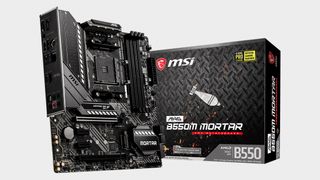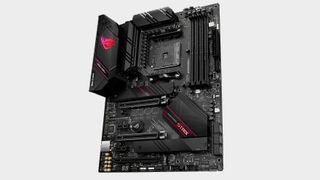Budget AMD B550 motherboards have landed, so we chucked a 16-core CPU at them
We can now start talking about the performance of the B550 chipset, and it isn't bad at all

There is a new AMD Ryzen motherboard chipset on the block, the AMD B550, and it's bound to cause a bit of confusion. It's a budget chipset… in theory at least. The idea being that this is the affordable alternative to the X570, in the same way that the B450 was the budget spin of the X470. The only problem is, this long after the initial X570 release it's not that 'budget'.
Some B550 motherboards have started rolling in with a higher price tag than the more-affordable X570s. The Gigabyte X570 UD, for example, starts at $160, while the Asus Strix B550-E is dangerously close to $300.
The big selling point of the B550 chipset, and the thing that separates it from the B450, is that it supports PCIe 4.0. That covers both graphics cards and, far more importantly right now, PCIe 4.0 SSDs. Yup, this now means you can build a budget system around the likes of the Ryzen 3 3300X (£120/$120) that supports NVMe SSDs with a throughput of 5GB/s.
B550s also support overclocking, although you'll need plenty of luck on that front, as AMD's chips don't readily take to such activities even on the higher-spec X570 boards. The newer chipset also supports SLI/Crossfire graphics cards, for what that's worth, and USB 3.2 Gen 2, which can hit 10Gbps.
In order to separate the B550s from X570 motherboards, there are a few important differences between the two, and the major one is that while pretty much everything on an X570 motherboard is driven by PCIe 4.0, on the B550 the main connection between the CPU and the chipset still uses a PCIe 3.0 bus—your GPU and SSD connects straight to the CPU, which is why these run faster, but everything else is going to be sharing a limited resource.
Overall though, and on paper at least, the B550 chipset looks like a winner. Which is why it's so annoying to see prices up to $300 (ASRock B550 Taichi). I've got a couple of B550 motherboards in right now, and I've been putting them through their paces.
- Asus ROG Strix B550-E Gaming - $270 | £240
- MSI MAG B550M Mortar - $170 | £157
In order to get an angle on these motherboards I decided to push them that little bit harder. Now the obvious choice would be to pair them with some equally budget-oriented components, but given the pricing, and the fact obvious isn't always interesting, I instead decided to push them a bit harder.
The biggest gaming news, reviews and hardware deals
Keep up to date with the most important stories and the best deals, as picked by the PC Gamer team.
Cue the Ryzen 9 3950X and a Nvidia RTX 2080 Super. The budget-friendly Addlink S90 NVMe 4x4 SSD, ThermalTake Toughram DDR4 3600 and a Corsair H115i AIO to keep that beefy CPU chilled. For comparison we tested against the Gigabyte X570 Aorus Master, which costs $390 (£375).








The results speak for themselves to certain degree, as the more expensive X570 motherboard did indeed perform much better, which is to be expected for the most part. The Gigabyte motherboard has beefier VRM cooling and takes two 8-pin ATX12V power connectors to ensure that the CPU has access to plenty of clean power, while the Asus B550 takes 1x 8-pin and 1x 4-pin for the CPU power and the MSI takes just a single 8-pin.
The question is, are these cheaper motherboards worth it compared with affordable X570 options?
The performance of the Asus B550 motherboard is a couple of percent off the X570, but it does cost $120 less. Meanwhile the MSI MAG B550M Mortar was even closer in some tests, and is $220 cheaper than the X570. We did witness alarming power draw on this board though, and performance during testing was erratic, to say the least. Cinebench performance dropped considerably towards the end of the initial sweep of testing—something we'll be investigating further during testing.

Both manufacturers have beefed up networking side of things, the Asus ROG Strix B550-E Gaming has an impressive audio setup and comes with WiFi 6 support among other things. So there's plenty in the box for the money, even if it still feels like a budget solution.
So are the B550s worth the asking price? While I'd love to have seen more affordable boards, the performance is still pretty strong, even given this fairly harsh testing setup. The Asus handled the 3950X well, although the MSI felt like it was up against the limits of what it was capable of. This is frustrating because the initial performance was impressive, but the moment the results started going awry, my confidence in it as a platform waivered.
Overall though, it looks like the B550 chipset may be one to watch, though obviously you'll need to pick your motherboards carefully depending on what system you've got in mind.
Alan has been writing about PC tech since before 3D graphics cards existed, and still vividly recalls having to fight with MS-DOS just to get games to load. He fondly remembers the killer combo of a Matrox Millenium and 3dfx Voodoo, and seeing Lara Croft in 3D for the first time. He's very glad hardware has advanced as much as it has though, and is particularly happy when putting the latest M.2 NVMe SSDs, AMD processors, and laptops through their paces. He has a long-lasting Magic: The Gathering obsession but limits this to MTG Arena these days.
Most Popular

